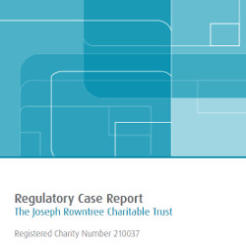The Charity Commission has released critical reports into the Joseph Rowntree Charitable Trust and Roddick Foundation over their funding of advocacy group Cage, which has been accused of acting as an apologist for terrorism.
In parallel, similarly-worded reports published today, the regulator said both charities which had funded Cage could not have been sure that their money was "used for exclusively charitable purposes".
The Commission initially investigated the two charities after a complaint in September 2013, which accused Cage of “spreading a message of support for jihadism, bigotry and hatred”.
Later, after a press conference in early 2015 - in which Cage defended the “extremely gentle” and “beautiful” Daesh executioner, Mohammed Emwazi, known as Jihadi John - the Commission sought promises from both charities that they would never again fund Cage.
Cage sought a judicial review of the decision, and the Commission conceded that it could not permanently “fetter charities' exercise of discretion”.
The case report today said that trustees at both funders had acted in good faith but could not be sure their money had been spent on charitable activities.
“Neither Cage nor the trustees properly understood the distinction between human rights activities which were charitable in charity law and those that were not,” the report into JRCT said.
It said trustees “had not sufficiently appreciated the importance of this distinction”.
In today's report on JRCT, the regulator concluded that it was “difficult to see how trustees could have been sufficiently assured that the monies given to Cage were used for charitable purposes, particularly as Cage is not a charity and not all of its activities furthered charitable purposes.
“The charity’s monitoring and reporting requirements were not robust enough in this particular case,” the regulator said.
JRCT funded Cage over a seven-year period, providing a total of £305,000 over that time. The figure amounted to approximately 15 per cent of the group’s income during the period 2007 to 2014.
The regulator similarly concluded that it had difficulty seeing how trustees at the Roddick Foundation “could have been sufficiently assured that the monies given to Cage were used for charitable purposes” – recommending further “improvements to its processes and procedures to ensure robust scrutiny and control of funds”.
The foundation provided a total of £120,000 to Cage over a four-year period, from 2009 to 2012.
'Good faith'
In a statement today, a spokesman for the Roddick Foundation told Civil Society News, it “welcomed” the regulator’s findings that trustees had “acted in good faith in taking the decision in 2009 to fund Cage”.
“Our funding relationship with Cage came to an end in 2012 and the Charity Commission’s report recognises the time that has elapsed since the grants in question were made", he said.
A spokesman for the Joseph Rowntree Charitable Trust said it had been “rigorously scrutinised” by the Charity Commission.
“The Commission’s long and detailed report makes it clear that our trustees acted in good faith, and that the grants were made to further our charitable purposes. There is no evidence that any funds have been misused,” the statement said.
“We are pleased that the Charity Commission’s enquiries have now finally concluded and that no further regulatory action is planned.
“The Trust would like to thank everyone who has supported us over the past two and a half years. The solidarity and backing of so many individuals and groups has meant a great deal to us.”
Regulator's 'impartiality'
In February, Cage wrote to MPs calling for them to investigate the Charity Commission over its “impartiality” in relation to Muslim charities.
At the end of February, the regulator issued new guidance for charities funding non-charitable organisations, urging them to restrict grant-giving to projects that further the charity's own purpose.









